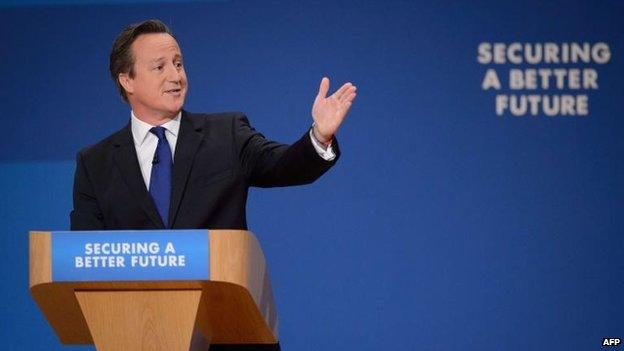Is Cameron more Thatcher than Thatcher?
- Published
- comments

There is a powerful political logic to David Cameron's announcement of tax cuts that will - the Tories believe - cut the tax bill of basic rate taxpayers by £500 a year by 2020 and the bill of those earning between £50,000 and £100,000 a year by a more handsome £1,313 a year.
He wants to deliver a powerful financial incentive for those on middle to high incomes to ignore the siren call of UKIP and vote Tory.
And it is striking that the prime minister even adopted some of last Friday's rhetoric of UKIP's leader, Nigel Farage, when pointing out that on Tory plans to lift the tax-free personal allowance to £12,500, no one on the minimum wage working up to 30 hours a week would pay a penny of income tax.
But is there economic - and social (dare I ask?) - logic?
There are several issues here.
One is whether the tax cuts would provide an incentive for people to work harder and smarter, for their own benefit and the UK's.
There may be a risk that lifting the zero-tax band will reinforce a shift to the creation of a growing number of workers, especially among the young, who are minded not to earn more than the tax-free minimum, to avoid the cost and hassle of paying any tax.
This could mean the take from income tax for the Exchequer would not bounce back as the economy continues to recover - which is already something of a headache for the chancellor, following this parliament's increase in the tax-free band to £10,000.
And it could mean large numbers of people don't make as much of themselves, don't take as many steps as are available to boost their earnings, as they could. Which might be rational for them, but would be of questionable utility to a UK in a skills race with the whole world.
Also it could leave hundreds of thousands of low paid workers semi-detached from the state and from public services, because they would never pay much more than a bean towards them - which is probably not a recipe for social cohesion.
So if David Cameron wanted to do as much or more for the low paid without stimulating some potentially unhealthy behaviour changes, he might have done better to cut national insurance for those on the minimum wage and just above - which would created a lesser penalty for those striving to boost their incomes.
By contrast, raising the threshold for 40% tax to £50,000 should create a benign incentive for those already doing quite well to do better for themselves - in a manner which might have warmed Margaret Thatcher's cockles.
There is another thing.
How would such tax giveaways be funded?
George Osborne, through his emissaries, is making it clear he won't take the money back by increasing taxes on the "hardworking people" cherished by all mainstream parties.
Or to put it another way, he has just added an estimated £7.2bn he would have to find in the next parliament from cuts in welfare and departmental budgets.
That's £7.2bn on top of just under £40bn of other cuts he needs, to achieve the budget surplus he wants by 2018-19.
And given that David Cameron confirmed today that the health budget is sacrosanct, and education is bound to be protected too, that leaves a colossal sum to be saved from benefits and from public services which have already been subjected to pretty intensive fiscal liposuction.
As I have mentioned before, David Cameron seems set on a course to roll back the state far more than Margaret Thatcher either wanted to do or succeeded in doing. And would do it seemingly without her ideological or rhetorical passion - but presumably, he would say, because needs must.